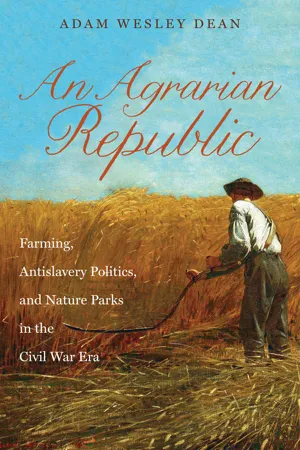
An Agrarian Republic
Farming, Antislavery Politics, and Nature Parks in the Civil War Era
- 240 pages
- English
- ePUB (mobile friendly)
- Available on iOS & Android
An Agrarian Republic
Farming, Antislavery Politics, and Nature Parks in the Civil War Era
About this book
The familiar story of the Civil War tells of a predominately agricultural South pitted against a rapidly industrializing North. However, Adam Wesley Dean argues that the Republican Party’s political ideology was fundamentally agrarian. Believing that small farms owned by families for generations led to a model society, Republicans supported a northern agricultural ideal in opposition to southern plantation agriculture, which destroyed the land’s productivity, required constant western expansion, and produced an elite landed gentry hostile to the Union. Dean shows how agrarian republicanism shaped the debate over slavery’s expansion, spurred the creation of the Department of Agriculture and the passage of the Homestead Act, and laid the foundation for the development of the earliest nature parks.
Spanning the long nineteenth century, Dean’s study analyzes the changing debate over land development as it transitioned from focusing on the creation of a virtuous and orderly citizenry to being seen primarily as a “civilizing” mission. By showing Republicans as men and women with backgrounds in small farming, Dean unveils new connections between seemingly separate historical events, linking this era’s views of natural and manmade environments with interpretations of slavery and land policy.
Tools to learn more effectively

Saving Books

Keyword Search

Annotating Text

Listen to it instead
Information
Notes
ABBREVIATIONS
- ADC
- Anna E. Dickinson Collection, Manuscript Division, Library of Congress, Washington, D.C.
- CFP
- Cole Family Papers, Charles E. Young Research Library, Department of Special Collections, University of California, Los Angeles
- CG
- Congressional Globe
- DEB
- Daily Evening Bulletin (San Francisco)
- G&JP
- Joshua R. Giddings and George Washington Julian Papers, Manuscript Division, Library of Congress, Washington, D.C.
- KSHS
- Kansas State Historical Society, Lawrence, Kansas
- NYDT
- New-York Daily Times
- NYT
- New York Times
- SFB
- San Francisco Bulletin
INTRODUCTION
CHAPTER 1
Table of contents
- Cover Page
- An Agrarian Republic
- Copyright Page
- Dedication
- Contents
- Acknowledgments
- Introduction
- One: A Question of Slavery in the West
- Two: Free Soil and the Rise of the Republican Party
- Three: Land-Development Politics and the American Civil War
- Four: The Creation of Yosemite and Yellowstone
- Five: Seeking Peace in the South and West
- Conclusion
- Notes
- Bibliography
- Index
Frequently asked questions
- Essential is ideal for learners and professionals who enjoy exploring a wide range of subjects. Access the Essential Library with 800,000+ trusted titles and best-sellers across business, personal growth, and the humanities. Includes unlimited reading time and Standard Read Aloud voice.
- Complete: Perfect for advanced learners and researchers needing full, unrestricted access. Unlock 1.4M+ books across hundreds of subjects, including academic and specialized titles. The Complete Plan also includes advanced features like Premium Read Aloud and Research Assistant.
Please note we cannot support devices running on iOS 13 and Android 7 or earlier. Learn more about using the app